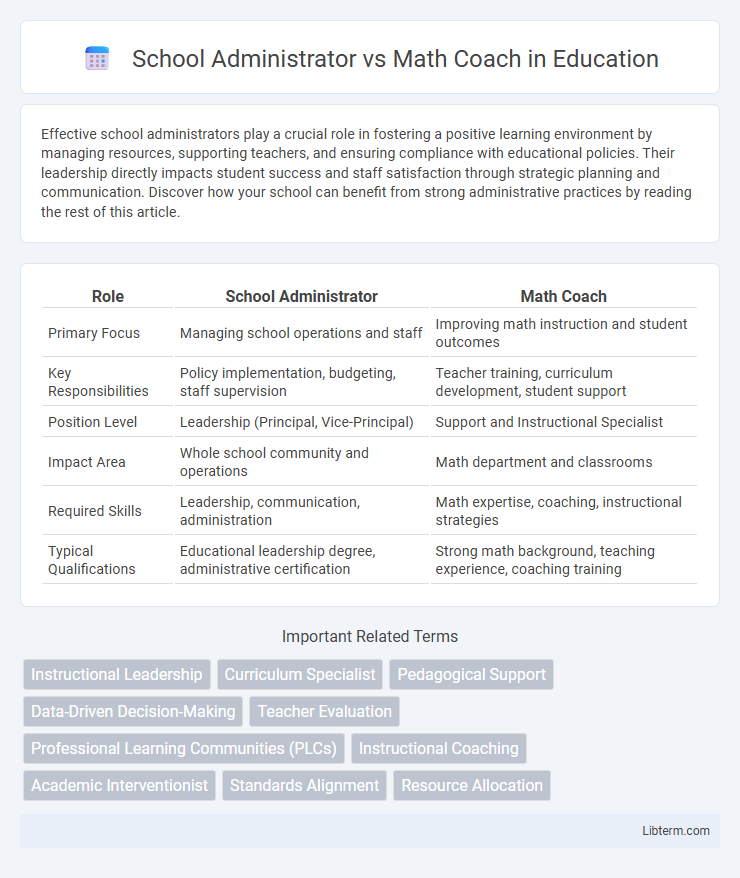Effective school administrators play a crucial role in fostering a positive learning environment by managing resources, supporting teachers, and ensuring compliance with educational policies. Their leadership directly impacts student success and staff satisfaction through strategic planning and communication. Discover how your school can benefit from strong administrative practices by reading the rest of this article.
Table of Comparison
| Role | School Administrator | Math Coach |
|---|---|---|
| Primary Focus | Managing school operations and staff | Improving math instruction and student outcomes |
| Key Responsibilities | Policy implementation, budgeting, staff supervision | Teacher training, curriculum development, student support |
| Position Level | Leadership (Principal, Vice-Principal) | Support and Instructional Specialist |
| Impact Area | Whole school community and operations | Math department and classrooms |
| Required Skills | Leadership, communication, administration | Math expertise, coaching, instructional strategies |
| Typical Qualifications | Educational leadership degree, administrative certification | Strong math background, teaching experience, coaching training |
Overview: School Administrator vs Math Coach
School administrators oversee the overall management of educational institutions, including staff supervision, policy implementation, and budgeting, ensuring the school operates efficiently and meets academic standards. Math coaches specialize in supporting teachers' instructional methods and curriculum development specifically in mathematics, focusing on improving student outcomes through targeted professional development and classroom strategies. Both roles collaborate to enhance educational quality but differ in scope, with administrators managing broad operational responsibilities and math coaches concentrating on subject-specific instructional improvement.
Key Roles and Responsibilities
School administrators oversee overall school operations, including policy implementation, staff management, budgeting, and ensuring compliance with educational standards. Math coaches focus specifically on enhancing math instruction by providing targeted teacher support, analyzing student data, and designing professional development to improve math achievement. Both roles prioritize student success but differ in scope, with administrators managing broad school functions and math coaches concentrating on math curriculum and pedagogy.
Educational Background and Qualifications
School Administrators typically hold advanced degrees in education administration or leadership, such as a Master's or Doctorate in Educational Leadership, and possess state certification or licensure in school administration. Math Coaches often have a strong background in mathematics education, with qualifications including a Bachelor's or Master's degree in mathematics or education, along with specialized training or certification in instructional coaching and curriculum development. Both roles require extensive experience in education, but School Administrators focus on management and policy, while Math Coaches specialize in supporting teachers and improving math instruction.
Leadership and Decision-Making
School administrators oversee overall school operations, balancing budget management, staff coordination, and policy implementation to ensure a conducive learning environment. Math coaches specialize in instructional leadership, using data-driven decision-making to enhance teaching strategies and student performance in mathematics. Both roles require strong leadership but differ in scope, with administrators focusing on broad school-wide initiatives while coaches concentrate on curriculum-specific improvements.
Impact on Student Achievement
School administrators shape overall educational policies and allocate resources that create an environment conducive to student success, influencing achievement at a systemic level. Math coaches provide targeted support to teachers by enhancing instructional strategies and promoting best practices, directly improving student learning outcomes in mathematics. Collaboration between administrators and math coaches amplifies the impact on student achievement by ensuring coherent goals and effective implementation of math education initiatives.
Professional Development and Training
School administrators typically focus on overarching professional development strategies, implementing district-wide training programs that align with educational goals and compliance standards. Math coaches specialize in targeted professional development by delivering hands-on, subject-specific training to improve instructional practices and student outcomes in mathematics. Both roles require continuous learning but differ in scope, with administrators emphasizing leadership and policy, while math coaches concentrate on content expertise and teacher mentorship.
Collaboration with Teachers and Staff
School administrators play a pivotal role in fostering collaboration by setting strategic goals, managing resources, and facilitating communication among teachers and staff to create an effective learning environment. Math coaches work directly with educators to enhance instructional practices, providing targeted professional development and real-time feedback based on classroom observations. Both roles prioritize teamwork and continuous improvement, but administrators focus on overarching school management while math coaches specialize in supporting math instruction and teacher growth.
Career Growth and Advancement
School administrators often have broader leadership responsibilities, managing overall school operations and staff, which can lead to higher-level roles such as district superintendent or education director, offering significant career growth opportunities. Math coaches specialize in improving math instruction and student achievement, with advancement potential into curriculum specialist or instructional coordinator positions focused on mathematics education. Both career paths provide unique avenues for professional development, with school administrators pursuing administrative leadership and math coaches emphasizing subject-specific instructional expertise.
Daily Challenges and Rewards
School administrators face daily challenges managing staff, budgets, and student discipline while ensuring compliance with educational policies; their rewards include fostering a positive school culture and driving academic success. Math coaches encounter challenges such as supporting teachers with varied skill levels and addressing diverse student learning needs, gaining satisfaction from improving math instruction and student achievement. Both roles require strong leadership and communication skills, with distinct impacts on educational outcomes.
Choosing the Right Path: Which Role Fits You?
Choosing between a School Administrator and a Math Coach depends on your passion for leadership versus specialized instructional support. School Administrators oversee the overall management of educational institutions, focusing on policy implementation, staff coordination, and operational efficiency. Math Coaches concentrate on enhancing teachers' instructional methods and improving student outcomes in mathematics through targeted professional development and curriculum support.
School Administrator Infographic

 libterm.com
libterm.com